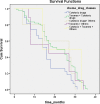Correlation of ERCC5 polymorphisms and linkage disequilibrium associated with overall survival and clinical outcome to chemotherapy in breast cancer
- PMID: 36686735
- PMCID: PMC9846539
- DOI: 10.3389/fonc.2022.1091514
Correlation of ERCC5 polymorphisms and linkage disequilibrium associated with overall survival and clinical outcome to chemotherapy in breast cancer
Abstract
Purpose: ERCC5 is a DNA endonuclease and nucleotide excision repair gene; its mutations lead to a lack of activity by this enzyme, causing oxidative DNA damage. This study aimed to assess the role of four selected single nucleotide polymorphisms (SNPs) in ERCC5 and their linkage disequilibrium associated with survival analysis and clinical outcomes in breast cancer.
Patients and methods: Four SNPs (rs751402, rs17655, rs2094258, and rs873601) of the ERCC5 gene were analyzed using the PCR-RFLP technique, followed by sequencing in 430 breast cancer (BC) cases and 430 cancer-free individuals. Statistical analysis was performed using MedCalc 17 and SPSS version 24, while bioinformatic analysis of linkage disequilibrium was performed using Haploview software 4.2.
Results: Multivariate analysis showed that the rs751402 and rs2094258 polymorphisms were significantly associated with an elevated risk of BC (P < 0.001), while the other two SNPs, rs17655 and rs873601, did not show any association (P > 0.001). Survival analysis revealed that rs751402 and rs2094258 had longer overall survival periods (P <0.001) than rs17655 and rs873601. Moreover, rs751402 and rs2094258 also had significantly longer overall survival (log-rank test, P < 0.005) for all three survival functions (positive family history, ER+PR status, and use of contraceptives), while rs17655 and rs873601 did not show any significant association. Only rs873601 showed a strong negative correlation with all the chemotherapeutic groups.
Conclusion: The current results suggest that variations in ERCC5 may contribute to BC development and that their genetic anomalies may be associated with cancer risk and may be used as a biomarker of clinical outcome.
Keywords: ERCC5 gene; breast cancer; linkage disequilibrium; polymorphism; survival analyses.
Copyright © 2023 Khan, Masood and Yasmin.
Conflict of interest statement
The authors declare that the research was conducted in the absence of any commercial or financial relationships that could be construed as a potential conflict of interest.
Figures


References
LinkOut - more resources
Full Text Sources
Research Materials

